The Week in politics: Will voucher bill go to House, Senate conference committee?
While Lt. Gov. Randy McNally, R-Oak Ridge, says the Tennessee General Assembly will "probably" hammer out an agreement on the governor's school choice proposal in a conference committee ― the final stop for legislation when the House and Senate are at odds on final language ― House Republican leadership remains optimistic that the two chambers will find common ground before then.
McNally's prediction is hardly a surprise as the Senate carries Gov. Bill Lee's relatively tailored bill to expand a school voucher program while House Republicans have filed a sweeping 39-page omnibus bill that would wrap the program with a slew of other education initiatives.
House Democrats agree the details are likely destined to be hashed out in conference committee.
"I think if any of this moves forward, it's definitely going to a conference committee," House Democratic Caucus Chair John Ray Clemmons, D-Nashville said Thursday. "The Senate seems to have its heels dug in. The Senate has made its position very clear. The House has its heels dug in. And then Lord knows what the governor's doing in all this. He's getting yanked around by the tail, as he usually does, by the legislature."
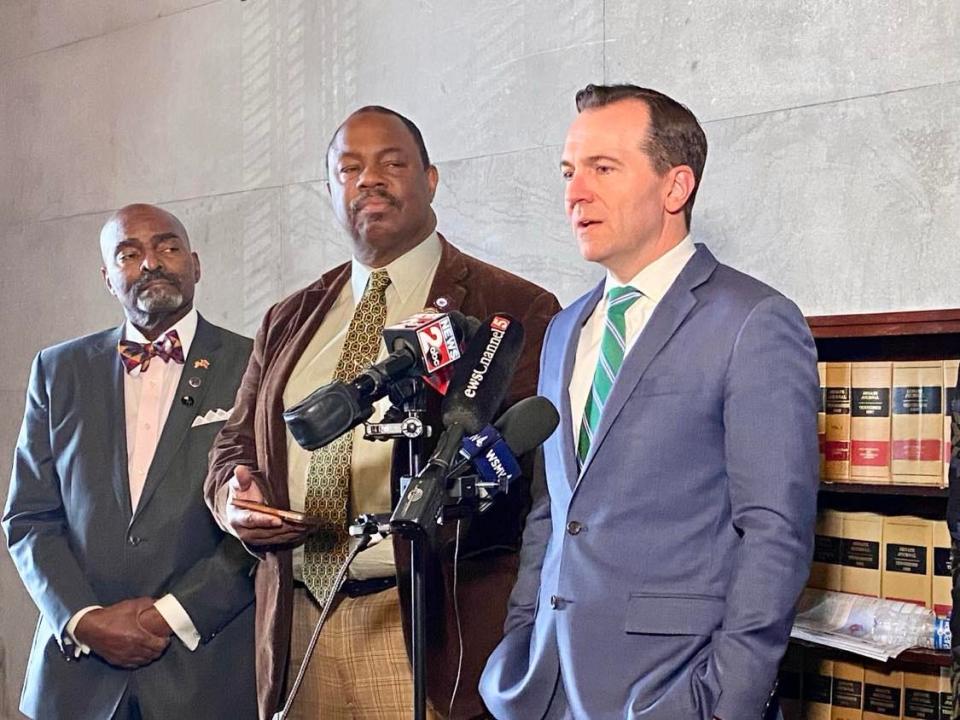
Though the two chambers are regularly juggling different versions of legislation, there's a gaping chasm in content and scope between the leading Senate and House versions, and it comes on the heels of an icy impasse between chambers after the unproductive August special session.
While House leadership continues to indicate a strong commitment to public education reforms included in their omnibus amendment that includes big changes to public school testing and accountability requirements, leaders on Thursday said they are optimistic that the two chambers will be able to bridge the gap.
"My hope is still that this will come together before a conference committee," said House Majority Leader William Lamberth, R-Portland. "But the good news is the House and the Senate are talking to one another. I look forward to those discussions. ... I don't think either side is just locked in stone. We're all working together."
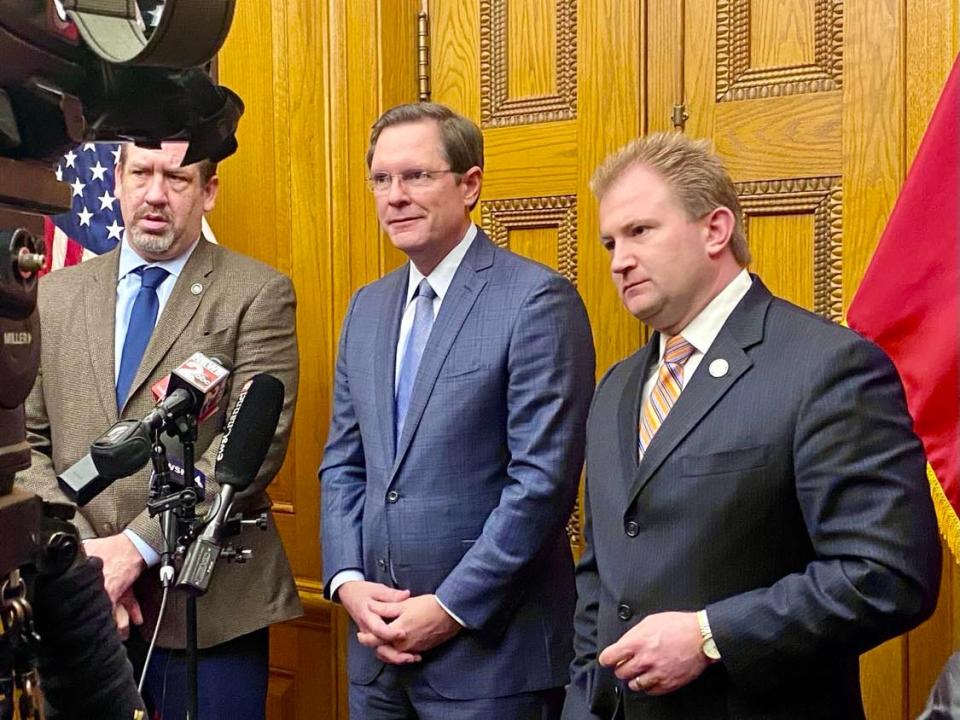
House Republican Caucus Chairman Jeremy Faison, R-Cosby, told reporters Thursday that he's spoken with Senate Majority Leader Jack Johnson, R-Franklin, to request that the two chambers seek to get on the same page before the bills get to their respective finance committees.
"I don't really want us to make it to a conference committee," Faison said. "Can we have some teams come together so that members know, they have more exposure, and we have a real idea ... what's gonna be on the House floor."
"I feel like that's a good possibility that there can be an agreement," Faison said. "I'm encouraged with that. I'm cautiously optimistic that we're going to move forward with what the House is doing."
Johnson brushed off concerns about the jarring differences between the two proposals.
"I'm not at all alarmed or concerned about the differences between the House and the Senate bill," he said.
Sexton defends his role, speaker pro tem attending committees
House Speaker Cameron Sexton, R-Crossville, rebuffed criticism from his Republican colleague Rep. Bryan Richey, R-Maryville, who on Tuesday insinuated that pro-voucher Republicans are conspiring to "ram it through" the committee process. During the K-12 Subcommittee on Tuesday, Richey indicated that leadership had "invited an additional member" to the committee, noting the unusual presence of House Speaker Pro Tempore Pat Marsh, R-Fayetteville, who does not sit on the K-12 Subcommittee.
While House rules specifically permit the House Speaker and/or Speaker Pro Tempore to sit and vote on any committee at any time, neither often exercises that right.
"We knew it was going to pass," Sexton said. "I think most people think it's because you think you're gonna break tied vote. That's not the case."
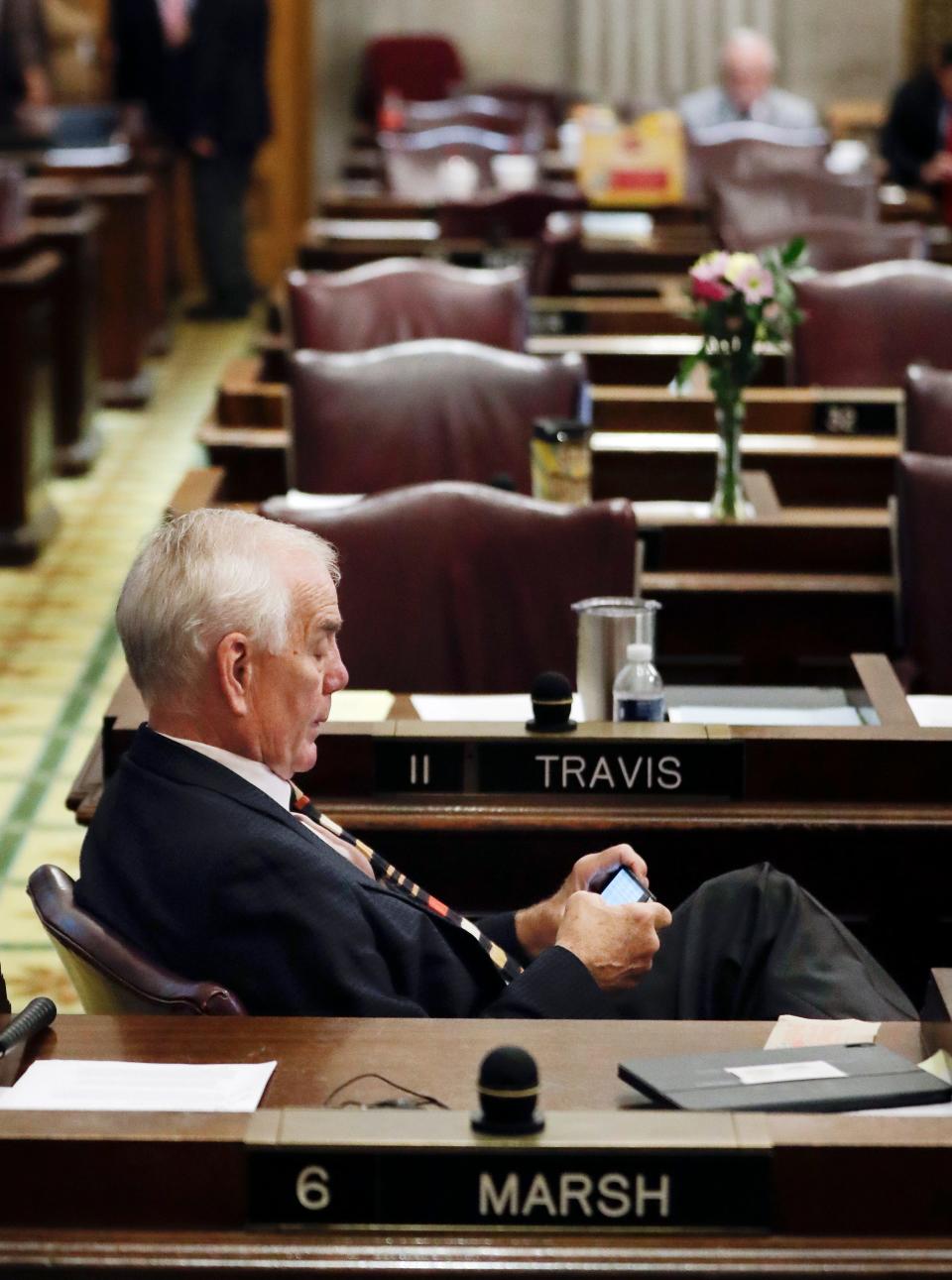
Sexton said sometimes he attends committees to "show some support" or to "see what's going on and answer questions," or at times "to make sure that there's no behind-the-scenes things going on."
"We knew we had the votes," he added "That wasn't what it was about."
Sexton told reporters that he and Marsh discussed Marsh's attendance at that committee prior to the meeting, and indicated he or Marsh may attend another committee meeting on the voucher bill in the future.
"If you're for it, that's great. If you're against it, that's great," Sexton said. "Let's cut down all these side games and behind-the-scenes games where you're trying to play 'gotcha.' And let's just do it the straight way."
Clemmons was doubtful.
"It's also pretty indicative of how much confidence they have in their own support for their own plan: They thought they would need a tie-breaking vote," Clemmons said. "I think maybe they may have a problem with the vote counting and know that they've got pretty thin ice, even in their own caucus for this scam. I'm sure Speaker Marsh didn't appreciate being shoved in there."
The legislation will be up in both the full House Education Administration Committee and the Senate Education Committee on Wednesday.
Judicial review for thee, not for me
Can the Tennessee House hold secret proceedings whenever it wants to?
Rep. Gino Bulso, R-Brentwood, thinks so, per his interpretation of case law.
Bulso made the eyebrow-raising comment in Wednesday's State Government Committee while defending his bill to block state courts from hearing challenges to any internal rule or regulation adopted by the General Assembly, a concept called judicial review.
Bulso filed House Bill 1652 after a Davidson County judge last year temporarily blocked the House from enforcing a ban on protest signs in committee meetings. The case was later dismissed after the special session ended, but Bulso is now arguing the General Assembly rises above any state judicial review.
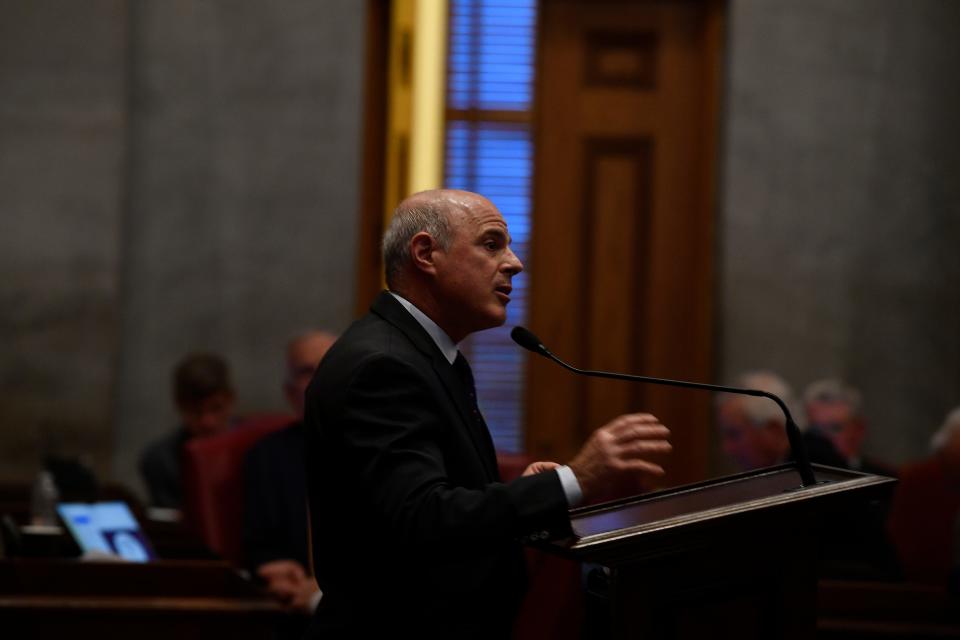
Bulso has repeatedly said the state Constitution is exceedingly clear on the issue — he just needs to pass a law to clarify it.
"This idea that there is a First Amendment right to hold up a sign in our gallery — no. The Constitution says, and the courts have held, that we could — if we wanted to, and whenever we want to — hold floor sessions in secret and there's nothing the judiciary can do about it," Bulso said.
The state Constitution says that the "doors of each House and of committees of the whole shall be kept open, unless when the business shall be such as ought to be kept secret."
Democrats on the committee opposed Bulso's bill, with Rep. Justin Pearson, D-Memphis, calling it "dangerous" and antithetical to the idea of co-equal branches of government.
"It frightens me a little bit that what we are saying is the legislature is going to be able to check itself. At that point, why do we even need the courts?" Rep. Darren Jernigan, D-Nashville, said. "You're not always going to be in the supermajority. Either way, what rules that come out should be subject to judicial review. "
More: Tennessee bill would block state courts from overturning legislature's rules
Bulso argued any challenges to legislative rules should be filed in federal courts. The Tennessee Supreme Court is technically excluded from Bulso's bill, but as an appellate bench the high court could only hear cases on appeal.
Allison Polidor was one of three women who sued Tennessee on First Amendment grounds after the trio was forcibly ejected from an August special session committee.
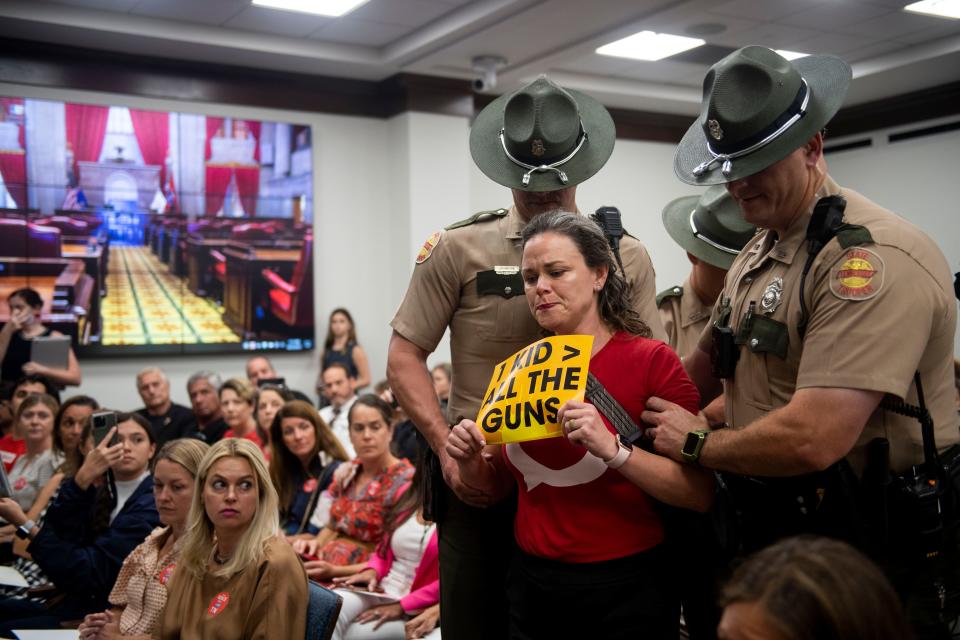
Polidor testified against the bill on Wednesday, arguing the bill was brought "solely to silence the voice of the people."
"You are not in charge of the judicial system," Polidor said. "If anything, you are inviting more lawsuits against the state when you pass egregiously unconstitutional laws."
Bulso called testimony against the bill "not valid."
Bulso pointed to the 2001 Tennessee case Mayhew v. Wilder, where the Tennessee Supreme Court held that the General Assembly did not intend to apply the Tennessee Open Meetings Act to itself and secret meetings on the budget were constitutional.
"The authority to make rules in the General Assembly is vested exclusively in the General Assembly. Courts are not entitled to intervene," Bulso said. "Does the body have an obligation to adopt rules that are constituional? Yes. Who determines if the rules are constitutional? The body does. That is not subject to judicial review."
Bulso referred to a recent opinion issued by Attorney General Jonathan Skrmetti, who argued House leadership was within its bounds to establish a ticketing system to the public gallery. Democrats on the committee pointed out Skrmetti's opinion is neither legally binding nor does it expand beyond a very specific issue.
The AG's opinion did not address the legislature completely meeting in secret.
Meanwhile, the committee's legal staff said they believes the bill could be "constitutionally problematic" if the legislature adopted a rule that "abridges another constitutional provision or abridges a person's constitutional rights."
Bulso's bill is the latest example of Republican legislation moving forward after legal staff advised of constitutional concerns.
While the bill has moved swiftly through House committees, it has yet to receive a hearing in the Senate Judiciary Committee, where it was assigned on Feb. 1.
Education chief's residency questioned
Tennessee Education Commissioner Lizzette Reynolds is facing questions about her residency after House Democrats this week held a news conference to accuse her of not living in the state.
Democrats alleged Reynolds has an active Texas voter registration and maintains a primary residence in Texas, which doesn’t have a state property tax.
“The second-highest paid person in the governor’s cabinet, paid with Tennessee taxpayer money, isn’t a Tennessee taxpayer,” Rep. Caleb Hemmer, D-Nashville, said.
Reynolds however, lives in Inglewood in Nashville, according to a home address listed on her state declaration of interest disclosure filed shortly after she was appointed. According to Davidson County property records, Reynolds does not own the home listed on the disclosure form.
Brian Blackley, a spokesperson for the Tennessee Department of Education, told The Tennessean that the commissioner is in her office in the Andrew Johnson Tower, and that she is there on a daily basis.
The department provided a copy of the commissioner’s voter registration form, which shows that she is registered to vote in Davidson County, at an East Nashville precinct.
Reynolds’ husband and teenage child remain in Texas, where her child plans to finish high school, Blackley confirmed. The family decided this arrangement to avoid her child’s education from being disrupted.
Reynolds has faced extensive criticism from Democrats due to her previous role at ExcelInEd, a national organization that advocates for school choice policies. Democrats have also asserted that Reynolds is not qualified under Tennessee law to serve as education commissioner because she is not currently licensed to teach in Tennessee.
Hemmer has requested an official opinion from the Tennessee Attorney General's Office over whether Reynolds’ background meets the qualifications for the job as outlined in state statute.
Lee's office has confirmed that Reynolds is currently enrolled in a teacher certification preparation course at the University of Tennessee at Martin. It is unclear when Reynolds enrolled in the program, or whether Lee requested Reynolds do so.
House candidate testifies in D.C.
A Clarksville woman and Tennessee House candidate testified before a U.S. Senate committee this week on abortion access.
Allie Phillips and her husband were excited to expand their family when she became pregnant in the fall 2022, but a routine anatomy scan the following February showed heartbreaking news: Their daughter, Miley Rose, was not developing correctly. Her organs were not functioning, she had no lung development and doctors identified a rare brain condition incompatible with life.
Under Tennessee's abortion law, Phillips did not qualify for an abortion, even though her doctors warned that the longer she stayed pregnant, the worse her daughter's condition would get and the more Phillips risked dangerous repercussions to her own health.
Phillips decided to travel to New York for an abortion.
Phillips has said the experience drove her to become involved in state politics and eventually announce her candidacy for Tennessee State House District 45 as a Democrat.
"Tennessee has a very vague exception to protect the life of the mother. Even though my life was at risk — I did not qualify," Phillips said in a campaign email on Wednesday. "Reproductive healthcare is not black and white, and we cannot lean on the "exceptions" written into one-size-fits-all policies. Because these exceptions simply do not work — and I'm a living testimony to that."
More: Why doctors are decrying Tennessee's 'dangerous' abortion ban as lawmakers debate change
Hundreds gather for gun reform rally
Hundreds of gun reform advocates gathered outside the Tennessee Capitol for a rally Tuesday.
Drew Spiegel, a freshman at Vanderbilt University, said he was at the Independence Day parade shooting in Highland Park, Illinois in 2022. Seven people died, while 48 others were hurt. Not even nine months later, he watched in horror as the Covenant School shooting left three children and three adult staff members dead in Nashville.
"I am now part of the generation where mass shootings feel inevitable," Spiegel said in an impassioned speech. He urged Tennessee lawmakers to take action on gun reform and gun safety measures.
The rally represented more than 100 organizations and was hosted by Moms Demand Action for Gun Sense in America, Students Demand Action for Gun Sense in America and Everytown for Gun Safety. It featured several speakers, including the mother of a gun violence victim, a pediatric trauma surgeon and a young child.
School-based gun safety training bill passes House
A measure to require public schools to offer age-appropriate gun safety training to children as early as pre-kindergarten passed the Tennessee House of Representatives on Thursday morning, despite bipartisan opposition.
Sponsored by Rep. Chris Todd, R-Madison County, House Bill 2882 would require schools to instruct children in basic gun safety principles such as not to touch found guns, and to go tell an adult if they find a gun.
Todd likened the gun safety principles to fire safety education that have long been taught to young children, including practicing fire drills in schools.
“If you see a gun, don’t touch it, it’s dangerous. Go tell an adult,” he said, summing up the principles to be taught to younger children.
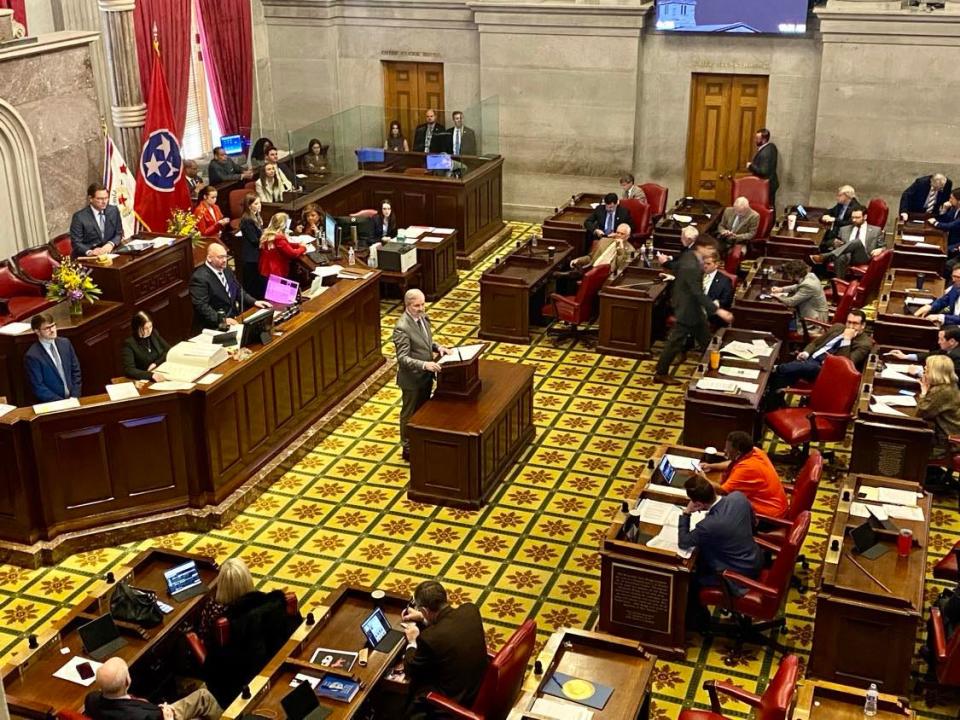
Rep. Antonio Parkinson, D-Memphis, who supported the legislation, called it “an equalizer," arguing that children in rural counties have had long had gun safety classes available, while Memphis children have not.
Republicans voted down multiple proposed amendments that sought to allow parents the ability to opt their child out of the training. Some Democrats, including Clemmons, argued that without such a provision, the bill “eliminates parent choice.”
“We teach our own children about gun safety,” Clemmons said.
Todd’s bill includes a requirement that any safety training offered to public school children be “viewpoint neutral” concerning the Second Amendment and gun violence. On Thursday, Republicans voted against taking up an amendment by Rep. Justin Pearson, D-Memphis, that sought to specifically exclude the NRA’s Eddie Eagle gun safety curriculum, as Pearson argued that the NRA’s curriculum is not “viewpoint neutral.”
Ultimately, the bill passed the House on a vote of 79 to 12, with Rep. Patsy Hazlewood, R-Signal Mountain, joining 11 Democrats who opposed. It has not yet been taken up in a Senate committee.
Early Voter turnout down 30% from 2016
With an incumbent president and former president both on the ballot on Tuesday, early voter turnout across Tennessee in the 2024 presidential primary elections was down 20% from the 2020 presidential primaries – and down nearly 30% from 2016, according to voter turnout numbers from the Tennessee Secretary of State’s office.
While early voter turnout was up slightly in the Republican primary election – 24% more people voted in the Republican primary than in 2020 – turnout among Democrats was down by 63% from four years ago.
The 2024 Presidential Primary elections in Tennessee will be held on Tuesday, March 5. Polls will be open from 7 a.m. to 7 p.m.
Catch up on the week
Sweeping school voucher, public education overhaul in Tennessee passes first House hurdle
Tennessee House passes bill along party lines to ban pride flags in public schools
House files 39-page voucher amendment overhauling key areas of Tennessee education
Covenant-inspired fire alarm bill heads to TN Gov. Bill Lee's desk after Senate passage
TN House GOP passes bill to block local governments from reappointing expelled lawmakers
Tennessee's US Rep Mark Green officially reverses course, will seek reelection to Congress
Got a question for us?
Got a question about state politics you would like us to tackle? Let us know. Email us at [email protected], [email protected] or [email protected].
Rachel Wegner contributed to this report.
This article originally appeared on Nashville Tennessean: Tennessee politics: House, Senate far apart on school voucher bill
